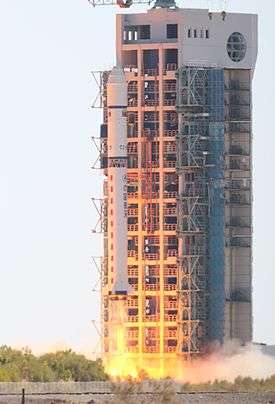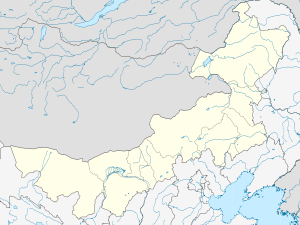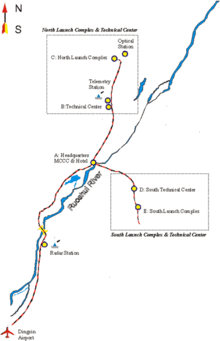Jiuquan Satellite Launch Center
Coordinates: 40°57′38″N 100°17′54″E / 40.96056°N 100.29833°E
| Jiuquan Satellite Launch Center | |
|---|---|
| 酒泉卫星发射中心 | |
 Launch of a LM-2D at Jiuquan Satellite Launch Center | |
 Location within Inner Mongolia | |
| Alternative names | Dongfeng Aerospace City |
| General information | |
| Status | Complete |
| Location | Ejin, Alxa, Inner Mongolia |
| Coordinates | 40°58′03″N 100°16′43″E / 40.96750°N 100.27861°E |
| Opened | 1958 |
| Jiuquan Satellite Launch Center | |||||||||
| Simplified Chinese | 酒泉卫星发射中心 | ||||||||
|---|---|---|---|---|---|---|---|---|---|
| Traditional Chinese | 酒泉衛星發射中心 | ||||||||
| |||||||||


Jiuquan Satellite Launch Center (JSLC; Chinese: 酒泉卫星发射中心; pinyin: Jiǔquán Wèixīng Fāshè Zhòngxīn) is a Chinese space vehicle launch facility (spaceport) located in the Gobi desert, Inner Mongolia. It is part of the Dongfeng Aerospace City (Base 10). Although the facility is geographically located within Ejin Banner of Inner Mongolia's Alxa League, it is named after the nearest city, Jiuquan in Gansu Province.
History
It was founded in 1958, the first of China's three spaceports. More Chinese launches have occurred at Jiuquan than anywhere else. As with all Chinese launch facilities it is remote and generally closed to foreigners.
The Satellite Launch Center is a part of Dongfeng space city (东风航天城), also known as Base 10 (十号基地) or Dongfeng base (东风基地), which also includes PLAAF test flight facilities, a space museum and a martyr's cemetery (东风烈士陵园).[1]
JSLC is usually used to launch vehicles into lower and medium orbits with large orbital inclination angles, as well as testing medium to long-range missiles. Its facilities are state of the art and provide support to every phase of a satellite launch campaign. The site includes the Technical Center, the Launch Complex, the Launch Control Center, the Mission Command and Control Center and various other logistical support systems.
The center covers 2800 km² and may have housing for as many as 20,000 people. The facilities and launch support equipment were likely modelled on Soviet counterparts and the Soviet Union has likely provided technical support to Jiuquan.
The launch center has been the focus of many of China's ventures into space, including their first satellite Dong Fang Hong 1 in 1970, and their first manned space mission Shenzhou 5 on 15 October 2003.
Shenzhou 6, the second human spaceflight of China, launched on 12 October 2005 on a Long March rocket from JSLC.
Shenzhou 7 was launched on 25 September 2008 by a Long March 2F (CZ-2F) rocket which lifted off from JSLC. This is the third human spaceflight mission of the Chinese space program. The mission, which included an extra-vehicular activity (EVA) carried out by crewmembers Zhai Zhigang and Liu Boming, marked the commencement of the second phase of the Chinese government's Project 921.
China's unmanned spacecraft Shenzhou 8 blasted off on October 31, 2011. It is the latest step in what will be a decade-long effort by the country to place a manned permanent space station in orbit.[2]
China's fourth crewed spaceflight, Shenzhou 9, launched from JSLC on 16 June 2012 at 18:37 local time (10:37 GMT). The 13-day mission included China's first female astronaut and docked with the country's Tiangong-1 space station module on Monday, 18 June 2012.[3]
In August 2016, China launched the first quantum communication satellite, the "Quantum Experiments at Space Scale", from the Center.[4]
Launch pads
- Launch Area 2, 3 launch pads:
- Launch Area 3, 2 launch pad: DF-1, DF-2, R-2.
- Launch Area 4 (South Launch Site), 2 launch pads, only active complex:
- SLS-1: CZ-2F launcher with nearby Vertical Assembly Facility.
- SLS-2: CZ-2C, CZ-2D and CZ-4C, operational since 2003
See also
- Space program of China
- Taiyuan Satellite Launch Center
- Xichang Satellite Launch Center
- Wenchang Satellite Launch Center
References
- ↑ "航天科技游圣地——东风航天城 (The Jerusalem of the space tech journey-Dongfeng space city)" (in Chinese). 新华网内蒙古频道 (Xinhua network inner-Mongol channel). December 5, 2007. Retrieved May 7, 2008.
- ↑ China's unmanned spacecraft Shenzhou 8 blasts off, Associated Press, October 31, 2011
- ↑ Chinese Long March 2F/G launches Shenzhou-9 on historic mission, NASASpaceflight.com, June 16, 2012
- ↑ "China Launches Pioneering 'Hack-Proof' Quantum-Communications Satellite". space.com. Space.com. August 16, 2016. Retrieved August 16, 2016.
External links
| Wikimedia Commons has media related to Jiuquan Satellite Launch Center. |
- Base 20 Jiuquan Space Facility on GlobalSecurity.org